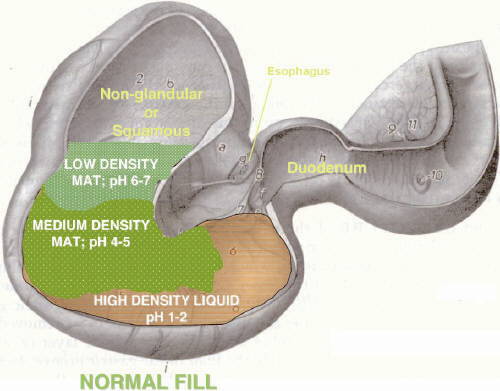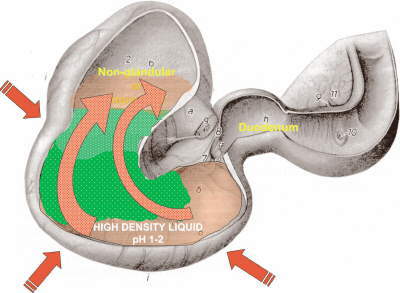Gastric Ulcers in Horses: Equine Gastric Ulcer Syndrome (EGUS)
by Robert N. Oglesby DVM
Introduction
Introduction
»
Causes
»
Clinical Signs
»
Diagnosis
»
Treatment
»
Prevention
»
Prognosis
»
More Info & Discussions
Equine gastric ulceration in being increasingly recognized as a cause of poor performance in adult horses and serious gastrointestinal disease of foals. Up to 93% of race horses get stomach ulcers, regardless of age. Almost 60% of other performance horses have stomach ulcers. Up to 57% of foals have stomach ulcers, particularly during the first several months of life. Increasingly we are recognizing that even the activities of pleasure horses can promote ulcer formation.
Most horses and foals with ulcers show no signs of illness but in the last few decades a constellation of symptoms commonly associated with horses in training has been associated with the presence of ulcers and has come to be called "Equine Gastric Ulcer Syndrome" (EGUS). Traditionally these horses have been experiencing what has been called "training let down" and these symptoms center around a horse in training that begins to do poorly for no easily observed reason.
There are Other Causes of Ulcers
There are several known causes of gastric ulcers in horses that can be differentiated by the history and the type lesions they cause in the stomach. Gastric ulcers in foals have a different cause than EGUS
...more. In the adult horse we can divide ulcers of the horse stomach into those caused by training and those caused by the admistration of nonsteroidal antiinflammatory drugs (NSAID's). The mechanism and location of the ulcers is very different with these two types of ulcers. There may be the rare horse overly sensitive to NSAID's, by following the recommended dosages of NSAID's ulceration is very unlikely
...more.
This article will focus on the type ulcers that occur in adult horses in training and describes clinical signs, diagnosis, treatment, and prognosis of adult horses with EGUS.
Causes
Introduction
»
Causes
»
Clinical Signs
»
Diagnosis
»
Treatment
»
Prevention
»
Prognosis
»
More Info & Discussions
Horses in training, particularly race training, are at much greater risk than the general horse population for EGUS. Gastric ulcers may be a major cause of decreased performance in these groups. Our current knowledge leads us to believe the cause of gastric ulcers is different than that of humans. For instance in humans and important factor is the presence of a bacteria,
Heliobacter sp.. Such an infectious etiology has not been found in horses though there continues to be work on this possibility. To understand the formation of gastric ulcers in performance horses it is important to understand the normal physiology of a horse's stomach.

The above diagram shows the normal strartification of the equine stomachs contents by consistency and ph.
|

The abdominal muscles contract during exercise causing acidic contents into the squamous region of the horses stomach.
|
The horses stomach is divided into a upper non-glandular section and a lower glandular region. While the upper part is covered with a squamous mucosa the lower sections are filled with the glands that produce fluid, enzymes, and acid. When functioning normally the horses stomach's contents stratify by consistency and ph,
see diagram. This upper portion of the stomach is sensitive to acidity and the portion of stomach that is most adversely effected by EGUS related ulceration in the horse. Normally this area is not normally exposed because most horses on pasture, left to their own devices, spend the majority of a day standing or walking around quietly which helps perserve the normal ph stratification.
Another difference between humans and horses is that horses secrete stomach acid continuously at a fairly constant rate. The slow almost constant foraging on pasture leads to persistent buffering of the acidity of the stomach with grass and saliva.
Studies on horses during training show a marked decrease in the ph of the upper part of the stomach whenever the horse's gait exceeds the walk. Careful measurements show that there is a increase in intra-abdominal pressure during exercise. It is hypothesized that this may push on the stomach and the gastric contents and forces the more corrosive acidic lower contents up into this upper region of the stomach which leads to ulcer formation. Interestingly just the anticipation of exercise has been shown to increase the acidity of the upper portions.
There are other factors that may predispose horses in work to gastric ulceration. Horses in intensive training are often stalled for large portions of the day and fed at discreet times. When trained extensively they receive high concentrate, low forage rations to help the horse meet its energy needs. Under such management of periodic feeding the horse may experience long periods of decreased access to food stuffs. Recent findings indicate that as little as one to two hours without feed or milk results in a very acidic (ph less than 2) environment in the stomach. Feeds high in rapidly soluble carbohydrates, such as found in grains, further increase stomach acidity. Recent work did not find an increase in stomach acidity related to 24 hour stall rest with hay available free choice.
Horses in training are often trailered during which they are not fed. This will increase the exposure of the upper lining of a increasingly acidic stomach content.
Clinical Signs
Introduction
»
Causes
»
Clinical Signs
»
Diagnosis
»
Treatment
»
Prevention
»
Prognosis
»
More Info & Discussions
You have just read the beginning of this article. To access the unabridged article
become a Member of Horseadvice.com! Your membership gets you instant access to this and over 600 articles on our site. Other benefits of your membership include participation in our discussion boards and access to our one button PubMed search tool for each topic.
Horseadvice can teach you to be a more knowledgeable horse owner which leads to a healthier horse and save you money. Really, we guarantee it.
Come Join Us!

